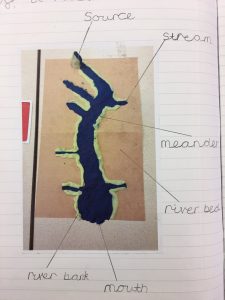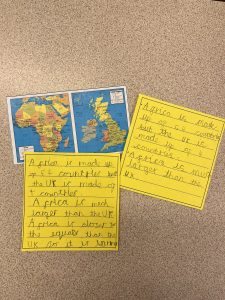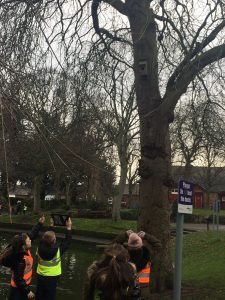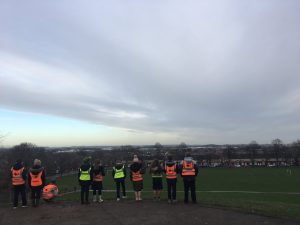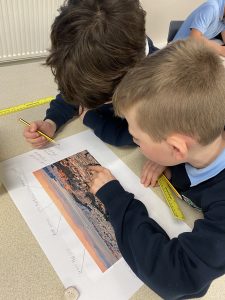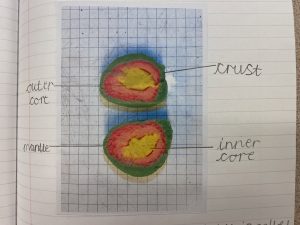Subject Leader : Kevin Saville
Geography teaches an understanding of places and environments. Through their work in geography, children learn about their local area and compare their life in this area, with that in other regions in the United Kingdom and in the rest of the world. Children learn how to draw and interpret maps and they develop the skills of research, investigation and problem-solving. Through their growing knowledge and understanding of human geography, children gain an appreciation of life in other cultures. Geography teaching also motivates children to find out about the physical world and enables them to recognise the importance of sustainable development for the future of mankind.
In school, the teaching of geography gives pupils an understanding of the world around them, its environments, places near and far, and the processes that create and affect them. It is about understanding the complexity of our world and appreciating the diversity of cultures that exists.
Our geographers will consider three main strands:
- Contextual world knowledge of locations, places and geographical features.
- Understanding of the conditions, processes and interactions that explain features, distribution patterns, and changes over time and space.
- Competence in geographical enquiry, and the application of skills in observing, collecting, analysing, evaluating and communicating geographical information.
In geography, pupils will have the opportunity to:
- use fieldwork to observe, measure, record and present the human and physical features
- use maps, atlases, globes and digital/computer technologies
- describe physical geography, including: climate zones, biomes, rivers, volcanoes and the water cycle
- describe human geography, including: types of settlement, land use, trade links, and natural resources
- understand geographical similarities and differences
- locate and name many of the world’s countries, cities and defined regions
- use geographical vocabulary
How is the content / theme chosen?
The content is chosen to make effective links with key themes and ensure coverage of the expectations as set out in the National Curriculum programmes of study, as well as the EYFS framework. At Normanton Common Primary Academy, we ensure a clear, sequenced progression, which is taught systematically for all pupils to acquire the intended knowledge and skills. The content may be adapted or changed, based upon the needs or interests of specific cohorts.
Key themes run throughout the year through the teaching of geography.
In Key Stage 1 these are ‘Human Impact in relation to caring for our World’, ‘Comparing the Physical and Human Features of the places that we study’ and ‘Comparing similarities and celebrating differences to our own way of life, to that of people in another country’.
In Key Stage 2 these are ‘Human & Environment Interaction’ (How humans have used/ adapted or modified the environment) and ‘How do our actions affect our world and cause harm?’
How do we ensure progression of knowledge and skills?
At Normanton Common Primary Academy we have in place, for each subject area, a knowledge and skills progression document, which is used for planning, to ensure sequenced and appropriate content for specific year groups. Teachers are clear on the learning and expectations for each year group, as this has been carefully selected and mapped out so that children are building on prior knowledge and skills each term and each year. Within these documents there are opportunities for differentiation, in order to meet the needs of all learners.
Click on the link below to see an overview of our Geography Curriculum:
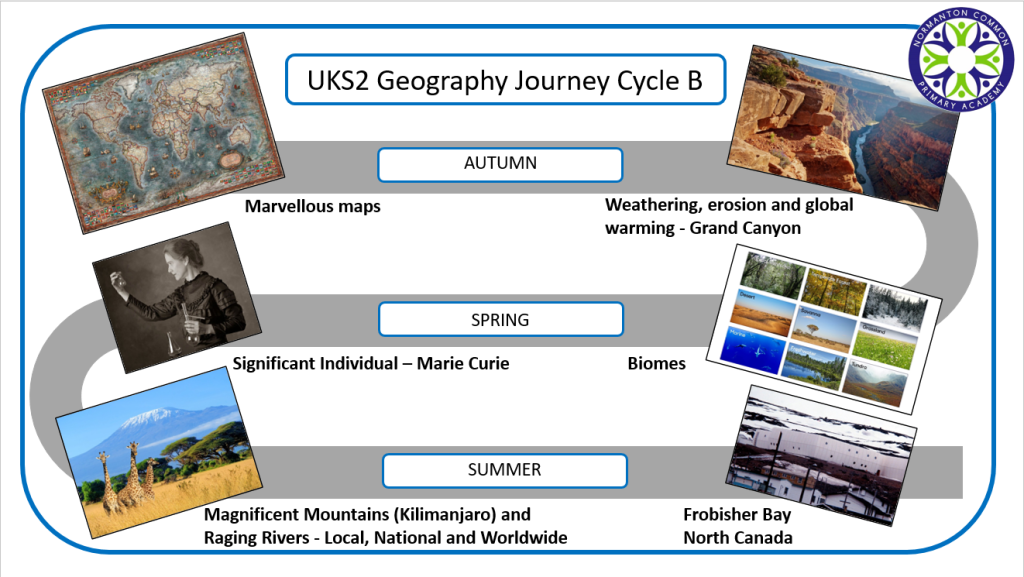
How is the subject taught?
Geography lessons are carefully planned through our themes, so that valuable links can be made across other subjects. A two year, long term rolling programme maps out the coverage of the discrete teaching and learning opportunities for children to develop and embed specific skills. This ensures coverage of the National Curriculum, for geography across Key Stage 1 and 2 and work within and beyond the Early Year’s Framework across our Foundation Stage. Within each discrete block of geography teaching, class teachers carefully plan the specific outcomes for their year group, based upon age appropriate knowledge and skills, as well as the needs of the cohort or individuals within it.
There is a strong focus on developing the geographic vocabulary of our children and retention of this through practical learning opportunities. New vocabulary is taught, with the emphasis on key geographic words and phrases . Although we actively introduce and are ambitious with the language we use, we understand the importance not to over complicate this language with very young children, but ensure underlying principles and meanings of the words are taught and understood.
Children are introduced to and reminded of key vocabulary. Questioning is used to check their understanding and prior knowledge, before new concepts, skills or knowledge are introduced.
Modelling is used by class teachers to clarify expectations, children are then given plentiful opportunities to consolidate, build upon and apply basic skills and knowledge, across a series of lessons, as well as across the year. When children are learning about a subject through a discrete teaching session they are explicitly told that today they are going to be ‘geographers’. They are then reminded of the key skills that they will learn, use and develop within this subject.
In geography, these are:
We are learning to:
- name and locate the world’s seven continents and five oceans
- name, locate and identify characteristics of the four countries and capital cities of the United Kingdom and its surrounding seas
- understand geographical similarities and differences
- identify seasonal and daily weather patterns
- use world maps, atlases and globes
- use compass directions
- use locational and directional language
- use aerial photographs and plan perspectives
- use fieldwork and observational skills
- say how a place has changed and how humans or physical factors have contributed to this
As well as the discrete teaching of knowledge in geography lessons, fieldtrips are planned to ensure that children have regular opportunities to embed their knowledge and practise their skills throughout the year. Children regularly engage in in practical, ‘hands on’ learning, visits out, as well as visitors to school, to enhance their experiences further.
Geography permeates throughout our curriculum and is one of our key subject drivers in developing the ‘Challenge & Educate’ part of our school curriculum. Through studying a range of people and places, children are taught to challenge stereotypes connected to gender, wealth, disability and cultural background and are educated that differences, including where you are born or live in the world, should be celebrated and are not a barrier to achievement.
Pupils also have additional opportunities to extend their geographic knowledge and skills through cross-curricular work. Strong links with other subject areas ensure that children have numerous opportunities to apply skills across the curriculum. Opportunities to learn about significant people, including naturalist, mathematicians and explorers are carefully chosen, so that children are continually developing the sense of the importance of geography in the wider world. This learning also strengthens the links between art, history, and PSHE.
Texts relating to geographical knowledge and concepts are used to further underpin this understanding and encourage questions from children. This ensures that elements of the geography curriculum are accessed by children throughout the year.
Teaching Geography in EYFS
Planning and teaching in EYFS is similar to that in Key Stage 1. The children are expected to develop a specific set of skills and knowledge appropriate to their age. This is often beyond the expectations that are set out in the end of year Early Learning Goals, as we prepare our children with the knowledge and skills they will need in geography, ready for year 1.
As well as fieldwork and the discrete teaching of skills and knowledge, children in EYFS are given the opportunity to explore, investigate, question and continually practise and embed their language and leaning through the areas of provision set up in the indoor and outdoor learning environments.
Children’s personal experiences such as visiting parks, libraries and museums increase their knowledge and sense of the world around them. Listening to a broad selection of stories, non-fiction, rhymes and poems will foster their understanding of our culturally, socially, technologically and ecologically diverse world while enriching and widening their vocabulary.
How do we know that our children are making progress?
Ongoing assessments of the children’s knowledge and skills is observed by the class teacher. Misconceptions are addressed and next steps carefully planned. Children’s outcomes are compared to the subject specific skills and knowledge documents. At the end of a block of discrete teaching (or term) subject leaders gather an overview of children’s outcomes in each subject area. This is used to plan appropriate next steps for their future learning, as well as provide an overview of learning within a subject area across the whole school. End of year assessments are collated for children at the end of EYFS and Key Stage 1.
How do we promote our Curriculum Intent?
Active Learners
- Children develop an interest and curiosity in the world around them.
- Geography teaching motivates children to find out about the physical world and enables them to recognise the importance of sustainable development for the future of mankind.
- Our geography curriculum allows our children to find their place in the world! They are shown how to look out at the world and how to respect others.
- Geography gives children a sense of pride and belonging as they get to know their own locality before exploring the wider world.
- They are equipped with the skills and knowledge to ensure they are responsible citizens in their school, local and wider global community.
Active Citizens
- Children will engage with wider, global issues and how these impact on their lives and how they can have an impact.
- Children will learn about many different cultures from around the world. They will compare and contrast local human and physical features in different places and to their own locality.
- Children will learn what life ‘looks like’ for people across the globe and how different cultures have, and continue to, influence their lives.
- Locally, children will explore their immediate surroundings – developing a sense of belonging
- Through engaging in eco activities, children will feel empowered that they are making a difference both locally and globally.
- Children begin to challenge how we live (in terms of sustainability) and how we can improve this in order to have a positive impact on the world.
Active Communicators
- Children are taught subject specific vocabulary.
- Children ask and answer questions.
- The children use books and stories as a focus to discuss similarities and differences between their culture and that of others.
- Texts relating to the three main geographical concepts under study are planned to ensure progression and ambition between year groups.
- All children will become familiar with the language of place and process but importantly, their vocabulary around wider issues such as global warming, plastic pollution and renewable energies will be commonplace as they look to their future and their place in it.
- Children will read books set in locations across the world which will be linked to their current theme. Authors will be selected for their locational knowledge and experiences.
- Children have the opportunity to participate in regular visits out to places, including exploring their own locality to develop a sense of belonging. Visits around the locality and participating in local events, allow them to question why things are as they are where they live and start to make comparisons with other places.
- Fieldwork is at the heart of being a geographer and this is carried out through carefully planned activities for all children in school to participate in. Fieldwork enables the children to develop a true sense of place. To use their senses to explore and become curious about the world around them, and develop their investigative skills to ask questions about where they live.
What wider opportunities are provided for our children?
Children have the opportunity to participate in regular visits out to places, including exploring their own locality to develop a sense of belonging. Visits around the locality and participating in local events, allow them to question why things are as they are where they live and start to make comparisons with other places.
Fieldwork is at the heart of being a geographer and this is carried out through carefully planned activities for all children in school to participate in. Fieldwork enables the children to develop a true sense of place. To use their senses to explore and become curious about the world around them, and develop their investigative skills to ask questions about where they live. Geography gives children a sense of pride and belonging as they get to know their own locality before exploring the wider world.
Educations visits where location and geographical features (physical and human) are discussed (or explicitly taught). These include:
- Haw Hill Park, Normanton
- The Parish Church, Normanton
- Yorkshire Wildlife park, Doncaster
- Filey, Yorkshire Coast
- Skipton Castle, Skipton
- Coal Mining Museum, Wakefield
- Bagshaw Museum, Batley
- Tropical World, Sheffield
- Autilita Arena (Young Voices), Sheffield
- Murton Park, York
- Kingswood, Doncaster/Sheffield
- City of London, London
- Various sporting events throughout West Yorkshire
Knowledge Organizers:
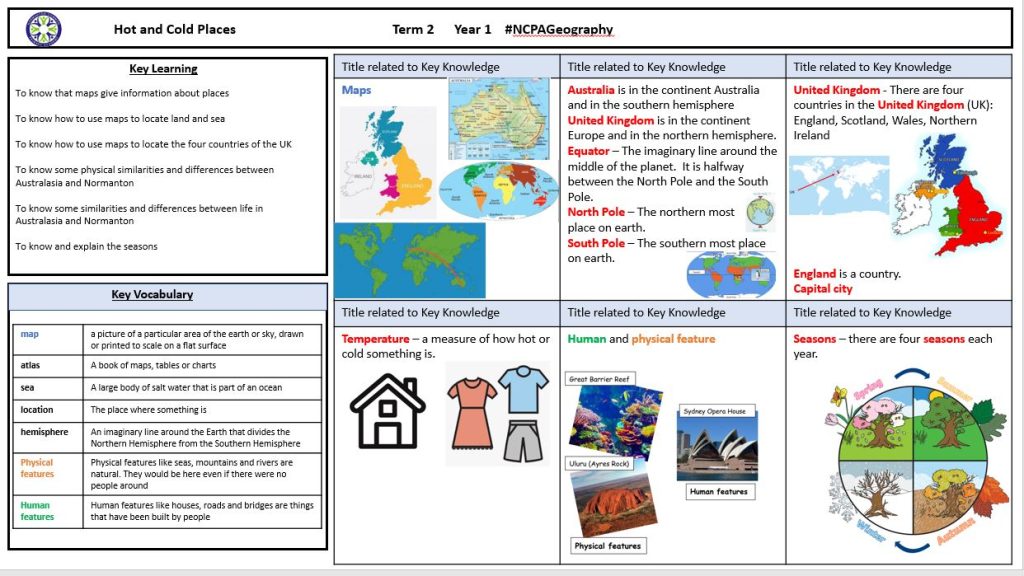
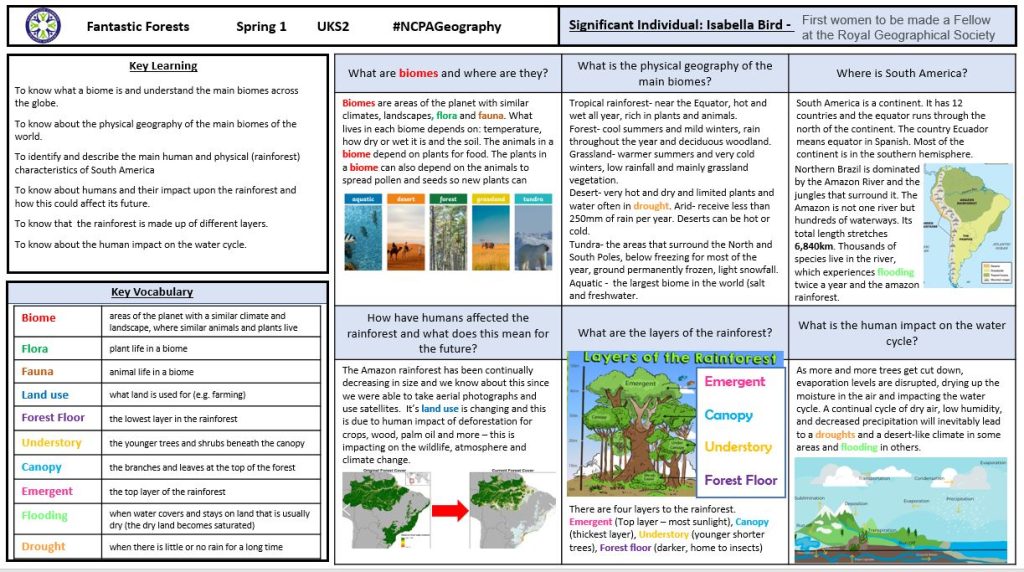
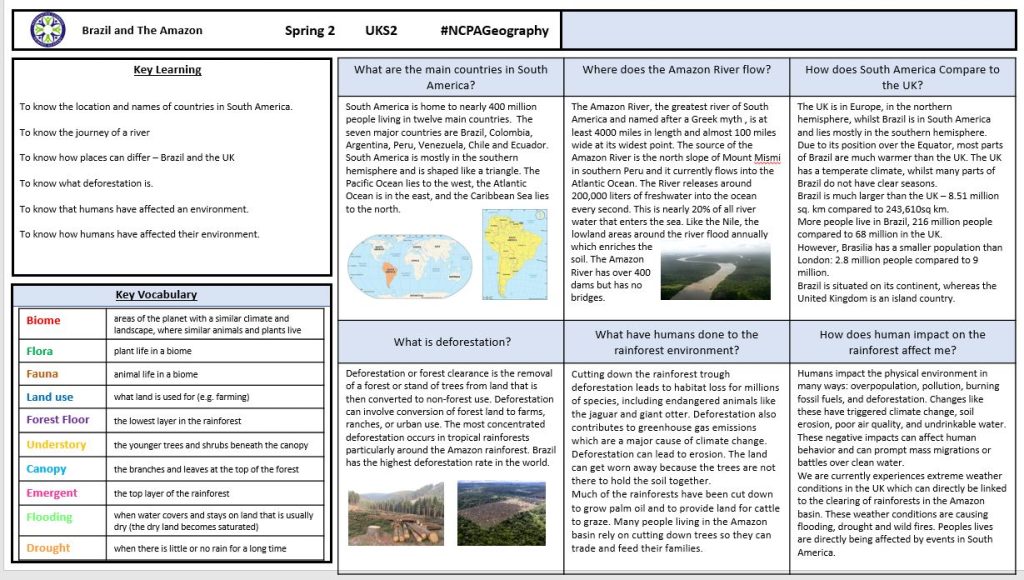
Geography in action...
